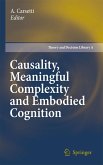This book explains the relationship between intelligence and environmental complexity, and in so doing links philosophy of mind to more general issues about the relations between organisms and environments, and to the general pattern of 'externalist' explanations. The author provides a biological approach to the investigation of mind and cognition in nature. In particular he explores the idea that the function of cognition is to enable agents to deal with environmental complexity. The history of the idea in the work of Dewey and Spencer is considered, as is the impact of recent evolutionary theory on our understanding of the place of mind in nature.
Table of contents:
Part I. Foundations: 1. Naturalism and teleology; 2. Externalism and internalism; 3. Spencer's Version; 4. Dewey's version; 5. On construction; 6. The question of correspondence; Part II. Models: 7. Adaptive plasticity; 8. The signal detection model; 9. Complex individuals, complex populations.
This book examines the relationship between intelligence and environmental complexity, and in so doing links philosophy of mind to more general issues about the relations between organisms and environments.
The book examines the relationship between intelligence and environmental complexity.
Table of contents:
Part I. Foundations: 1. Naturalism and teleology; 2. Externalism and internalism; 3. Spencer's Version; 4. Dewey's version; 5. On construction; 6. The question of correspondence; Part II. Models: 7. Adaptive plasticity; 8. The signal detection model; 9. Complex individuals, complex populations.
This book examines the relationship between intelligence and environmental complexity, and in so doing links philosophy of mind to more general issues about the relations between organisms and environments.
The book examines the relationship between intelligence and environmental complexity.








